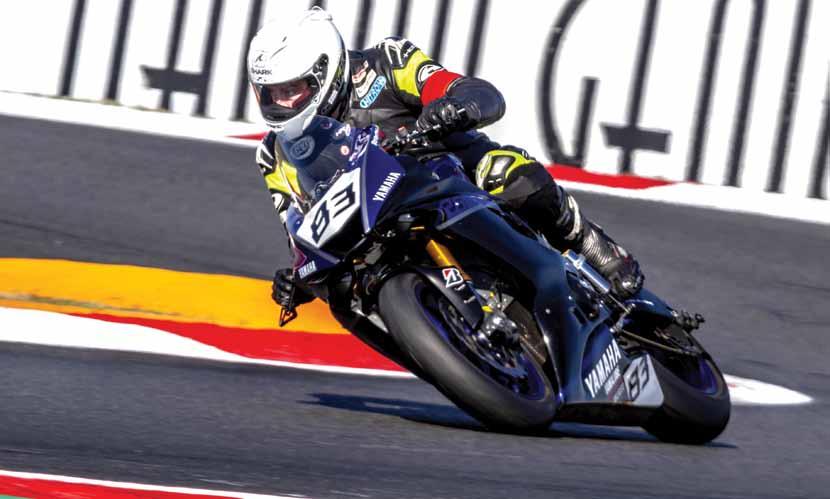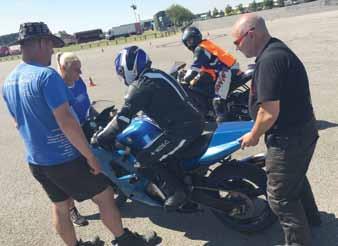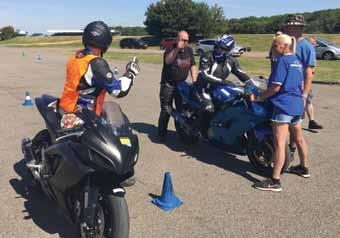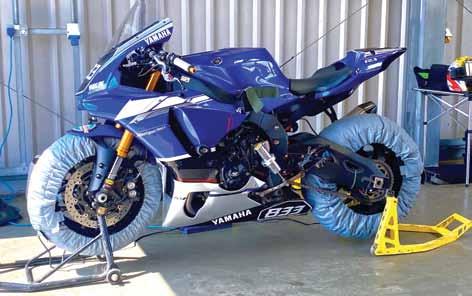
6 minute read
Adapt & Ride
The bike experience enables disabled people to get back on a motorbike, but it needs help
Words: Peter Henshaw Pictures: Talan Skeel-Piggins
Advertisement
The phrase ‘life changing injuries’ usually tells a sad story (to put it mildly), but for Talan SkeelPiggins, it’s been a tale of grit, determination and sheer achievement, coming back from a serious motorcycle accident to ski, sail and ride a bike. Not only that, but he started The Bike Experience, which has enabled disabled motorcyclists to ride a bike again.
The ex-naval officer was already a high achiever, captain of the RN Ski Team, and a PE teacher looking forward to a career in physical education. Then in March 2003, riding his bike to a rugby match, the car in front stopped suddenly, Talan slid off onto the other side of the road and was run over by an oncoming car. He suffered catastrophic spinal cord injuries leaving him paralysed from the mid-chest down. Imagine the blow, if your life is built around physical activity and achievement.
Then just ten days after the crash, Talan met a guy who had been in a wheelchair for five years, who told him that it was possible for a paraplegic to ski. Within a couple of days, he had decided he would not only get back to skiing but compete for Britain in the Paralympics. And he did just that, using a special sit ski that enabled him to steer leaning his whole body. Talan ended up as European Champion, going on to teach other paraplegic skiers.
But he needed another goal, and this time it was to get back on a motorcycle – not a trike or sidecar outfit, but a two-wheeler. “Some people like trikes, and that’s great,” Talan told me, “but I wanted the freedom, the movement of a bike. Wheeling yourself around in a wheelchair you're completely upright; that's your life. I really missed that flowing movement through corners. Being paralysed from the armpits down, I don't have any stomach muscle power, so on a trike the lateral forces make your upper body slump to one side, but on a bike, the forces push you down into the bike – so I can corner as fast as I want, and once you're moving it's fine.”
Practicalities
That’s all very well, but how does it work out in practice? “The first problem is staying on the bike,” says Talan. I’ve fitted cycle toeclips to the footpegs – the pegs take the weight, and the clips with Velcro straps keep the feet in place, while my legs are strapped in, with Velcro on the knee sliders, otherwise they would flap about. To change gear, there’s a thumb-operated Kliktronic solenoid, which has no finesse but works and for track days that’s all I need. For racing, you have to have two operational brakes so I have a thumb rear brake as well.”
Once on the bike and moving, he can ride, steer and bank round corners like anyone else, but the tricky bit, when you can’t put your feet down, is stopping and starting. “Basically I have two helpers. The bike is on a paddock stand and I wheelchair up beside it before being lifted on and strapped in. Then one helper holds the front of the bike and the other removes the paddock stand and holds the rear; I start the bike, put it in gear, the front helper


Left and above: Two helpers hold the bike upright until the rider is ready to take off - it's simple but effective Bottom: Talan's race bike - he's won the 600cc world Championship (Paralysed class) twice
stands to one side and I ride off. It sounds difficult but it’s really quite easy, just like pulling away from the lights, but you do just have to make sure you don’t stall, because if the bike stops you fall off. And you have to really trust your two helpers, who have to be in place to catch you when you come back in.”
Otherwise, Talan on a bike looks indistinguishable from anyone else enjoying a trackday or racing. If there’s an incident out on the track and he just has to stop, it’s clutch in and drift over to a gentle stop, leaning on the armco. If that’s not possible, he looks for a patch of grass and does a planned topple off at subwalking pace. “But not on gravel, because it hurts and, more to the point, damages the bike.” None of which has stopped Talan racing all over the world, winning the 600cc World Championship (Paralysed category) twice with podium finishes in open races.
The bike experience

All good stuff, but Talan knew that there are other paraplegics, ex-motorcyclists, who wanted to get back on a bike again. So he set up The Bike Experience as a charity to make this possible. Sponsorship from Awards for All and Bennetts Insurance helped cover the considerable costs such as public liability insurance and hiring a venue – all the riders had to do was bring themselves, two helpers and their kit. As The Bike Experience grew, it was able to provide kit and helpers, while a fleet of six adapted bikes was built up. There’s a 125cc Honda Varadero (with legs linked to the suspension to keep it upright), two autotransmission Aprilia Manas, two SV650s and a Suzuki GSF, so plenty of variety.
“Riders who turned up to do this were often very scared,” says Talan, “with their self-belief down to zero. But by the end of the day they would discover that they could ride a bike and their confidence would skyrocket. It's very rewarding for the volunteers as well as me, and makes up for all that time spent organising everything.” Some riders went on to do track days and others to race – Andy Houghton learnt to ride again with The Bike Experience and now races an S1000RR.
But then Covid came along. “That really threw a spanner in the works, because all charity funding was channelled towards Covid – everything else just dried up.” The plain truth is that The Bike Experience, which did such good work pre-Covid and went into hibernation through the lockdowns, is now finding it difficult to restart – it may even have to shut up shop altogether.
“It all comes down to money,” says Talan. “All told, the running costs come to about £25,000 a year to include insurance, the venues, servicing the bikes, tyres and fuel. Nobody gets paid, including me.” In the meantime, all the bikes, kit and trailer have to be stored, which costs £650 a month, something Talan is currently funding out of his own pocket.
So what’s the future for The Bike Experience? “If by September we don’t have any new funding come forward,” says Talan, "I may have to dissolve the charity.” Which would be a great shame, because it has clearly done great work in getting disabled riders back onto bikes and rebuilding their self-confidence, not just in motorcycling, but life in general. Let’s hope that those adapted bikes, plus the sheer motivation of Talan Skeel-Piggins, can be put to work again.
want to see The bike experience?
You can see The Bike Experience in action at the British Motor Show at Farnborough, 18th-21st August 2022.










